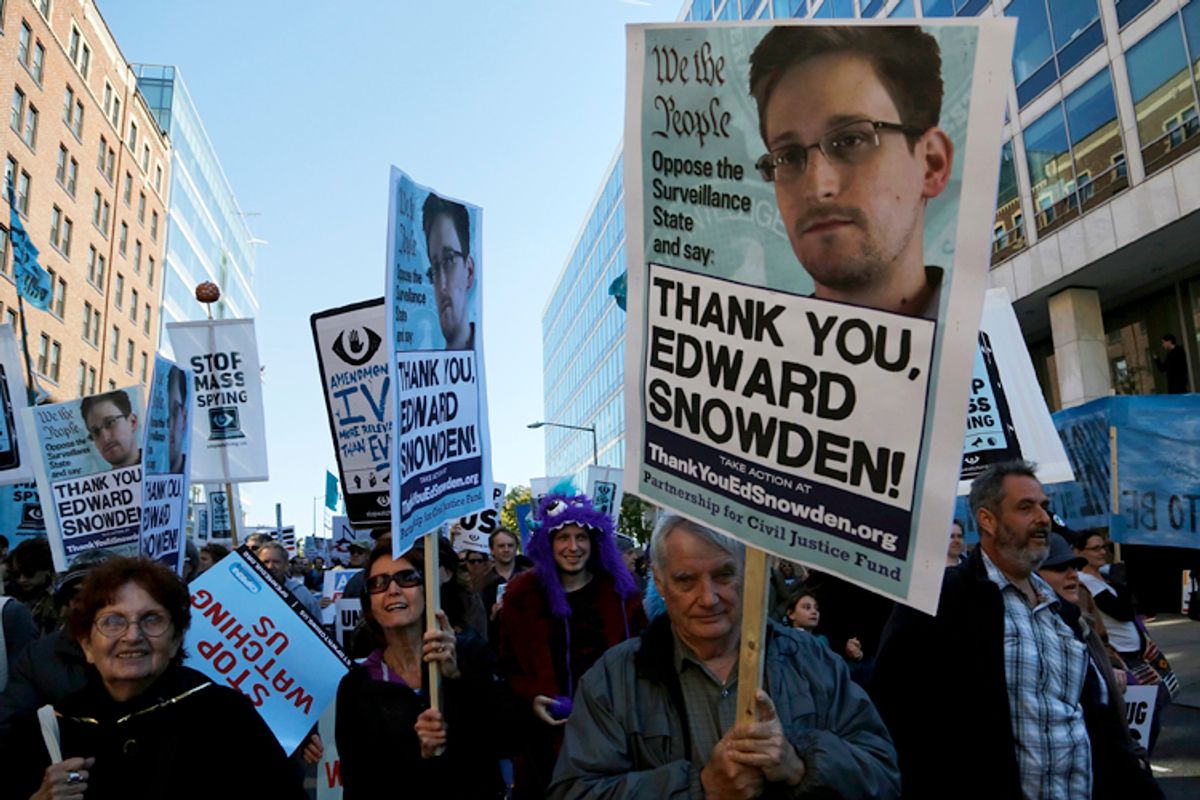NSA whistle-blower Edward Snowden spoke via video link to an eager SXSW audience Monday. While still a fugitive in Russia, facing Espionage Act charges on home soil, Snowden had a strong, unapologetic message for the U.S. public.
Stressing a point highlighted by his leaked documents, the whistle-blower noted that through the NSA, the U.S. "set fire to the Internet." The post-9/11 security state prioritized mass surveillance and data hoarding in such a way that compromised the structural integrity and security of the entire Web. With this as the focus of his remarks, Snowden's SXSW appearance was no apologia or self-defense. It was, as his legal adviser at the ACLU, Ben Wizner, noted, "a call to arms."
With the festival's techie denizens strongly in mind, Snowden's comments explicitly traced a strategy for resistance against the surveillance state. If the terrain of mass surveillance is a networked society with intentionally weakened security, then new types of networked communications with an eye to privacy and security are the grounds from which to fight back. Snowden urged his audience to use encryption and tools like Tor and Noscript, which are already easily available, in their daily lives. "Encryption does work," he stressed. As ACLU technologist Christopher Soghoian commented in conversation with Snowden, "We need to prioritize security ... and NSA is not crazy about us going down that path." The idea is that while encryption techniques remain imperfect, generalized use of better online security practices would raise the cost of mass surveillance, hopefully shifting the government's calculus on the worth of dragnet spycraft.
As I've noted before: Resisting the surveillance state is about more than demanding NSA reforms. The way we live and communicate online renders us ripe subjects for surveillance. We should, as Snowden urged Monday, use any privacy and encryption practices available to mitigate this fact. But it is a mitigation at best while tech giants march in goose step with government interests in producing entirely trackable communications networks. Indeed, Snowden -- whose privacy practices must be close to unparalleled -- used Google+ to speak to the SXSW audience. Even today's most notorious whistle-blower relies on Google, a pillar of the surveillance state's apparatus. Snowden's point Monday, however, is that technologists can and must do better when it comes to disenabling dragnet surveillance.
Snowden's words aligned with the strategies under development by civil liberties groups and privacy-concerned technologists to make basic encryption readily available to the average Internet user, while developing better, more secure Internet servers and networks. The whistle-blower also stressed the importance of changing the state's attitude to data away from a hoarding complex and toward what's been dubbed "data austerity" -- namely, that communications data should not be stored by government agencies or private firms longer than absolutely necessary. "It's not that you shouldn't collect the data, it's that you should only hold it as long as you need," Snowden said Monday. The remark was revealing of his broader attitude toward surveillance: an understanding that some surveillance is necessary in the interests of national security, but that need not align with an unchallenged state of total surveillance and data hoarding.
Snowden's comments took a long view, addressing no less than the future of the Internet and national security in light of his leaks. Plans to generalize encryption and build less compromised online networks will take time and hard work by willing technologists -- the intended audience of his SXSW address. Meanwhile, as Snowden's remarks highlighted, tools are already available with which to start building some generalized resistance to total surveillance. The whistle-blower has sacrificed much; the least we can do is respond to his "call to arms" and build a resistance to surveillance in our daily lives.



Shares